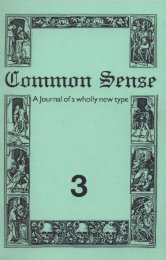i on thomas paine reviews: origins of crisis in ussr - Common Sense
i on thomas paine reviews: origins of crisis in ussr - Common Sense
i on thomas paine reviews: origins of crisis in ussr - Common Sense
Create successful ePaper yourself
Turn your PDF publications into a flip-book with our unique Google optimized e-Paper software.
Page 48 Comm<strong>on</strong> <strong>Sense</strong> - Issue 15<br />
each <strong>of</strong> these presuppositi<strong>on</strong> is supposed to render its c<strong>on</strong>trast<strong>in</strong>g term coherent. The two<br />
presuppositi<strong>on</strong>s are: the presupposed freedom <strong>of</strong> the social subject and the presupposed<br />
logic <strong>of</strong> the capitalist system. No answer can be provided as to the c<strong>on</strong>stituti<strong>on</strong> <strong>of</strong> both<br />
labour's self-activity and capital's cajol<strong>in</strong>g power. The <strong>on</strong>ly answer possible is the<br />
denunciati<strong>on</strong> <strong>of</strong> capital as subord<strong>in</strong>at<strong>in</strong>g labour's aut<strong>on</strong>omy and a study <strong>of</strong> the chang<strong>in</strong>g<br />
compositi<strong>on</strong> <strong>of</strong> labour's revoluti<strong>on</strong>ary subjectivity which is seen as be<strong>in</strong>g <strong>in</strong> oppsiti<strong>on</strong> to<br />
a presupposed logic <strong>of</strong> capital.<br />
In sum, the <strong>in</strong>ternal relati<strong>on</strong> between capital and labour is transformed <strong>in</strong>to a relati<strong>on</strong> <strong>of</strong><br />
mere oppositi<strong>on</strong>. thus reduc<strong>in</strong>g the <strong>in</strong>ternal relati<strong>on</strong> between form and substance to a<br />
simple juxtapositi<strong>on</strong> <strong>of</strong> oppositi<strong>on</strong>. Thereby, labour is taken as a <strong>on</strong>e-sided abstracti<strong>on</strong>. At<br />
the same time, the essentialisati<strong>on</strong> <strong>of</strong> the subject goes hand-<strong>in</strong>-hand with the fetishisati<strong>on</strong><br />
<strong>of</strong> capital as a 'bewitch<strong>in</strong>g power'. C<strong>on</strong>trary to see<strong>in</strong>g the relati<strong>on</strong> between capital and<br />
labour as a social relati<strong>on</strong> qua c<strong>on</strong>tradicti<strong>on</strong> <strong>in</strong> and through the forms c<strong>on</strong>stituted by this<br />
relati<strong>on</strong> itself, the <strong>in</strong>sistence <strong>on</strong> labour as merely 'aga<strong>in</strong>st' capital dismisses dialectics as a<br />
c<strong>on</strong>cept that moves with<strong>in</strong>, and is a moment <strong>of</strong>, its object As was reported above, the<br />
understand<strong>in</strong>g <strong>of</strong> labour as exist<strong>in</strong>g aga<strong>in</strong>rt capital <strong>in</strong>volves a c<strong>on</strong>ceptualisati<strong>on</strong> <strong>of</strong> capital<br />
as a mach<strong>in</strong>e-like entity. Capital becomes a logic, def<strong>in</strong>ed by certa<strong>in</strong> laws whose<br />
irrati<strong>on</strong>ality provides oppositi<strong>on</strong>al space for <strong>in</strong>surrecti<strong>on</strong>. The relati<strong>on</strong>ship between<br />
structure and struggle is merely wnceived <strong>of</strong> as a relati<strong>on</strong> <strong>of</strong> cause and effect i.e. the<br />
disruptive and revoluti<strong>on</strong>ary power <strong>of</strong> the work<strong>in</strong>g class causes disrupti<strong>on</strong> and <strong>crisis</strong> to<br />
which, <strong>in</strong> turn, capital resp<strong>on</strong>ds by reimpos<strong>in</strong>g its dom<strong>in</strong>ati<strong>on</strong> over labour (see Negri,<br />
1979). Such a view undercuts the <strong>in</strong>ternal relati<strong>on</strong> between structure and struggle and<br />
replaces it by a sociological <strong>in</strong>vestigati<strong>on</strong> <strong>in</strong>to <strong>in</strong>surrecti<strong>on</strong>ary forms <strong>of</strong> be<strong>in</strong>g which<br />
exploit the <strong>in</strong>c<strong>on</strong>sistencies <strong>of</strong> the capitalist system. The noti<strong>on</strong> <strong>of</strong> the presence <strong>of</strong> labour<br />
<strong>in</strong> and aga<strong>in</strong>st capital effectively says that labour does not exist outside capital. The class<br />
struggle exists <strong>on</strong>ly <strong>in</strong> and aga<strong>in</strong>st the forms <strong>in</strong> and through which the c<strong>on</strong>stitutive power<br />
<strong>of</strong> labour exists gua c<strong>on</strong>tradicti<strong>on</strong>. Of course <strong>in</strong> a sense the class struggle exists <strong>in</strong> the<br />
form <strong>of</strong> revoluti<strong>on</strong>ary separati<strong>on</strong>, but it so exists <strong>on</strong>ly as <strong>on</strong>e extreme pole <strong>of</strong> the<br />
dialectical c<strong>on</strong>t<strong>in</strong>uum <strong>of</strong> transcendence and <strong>in</strong>tenati<strong>on</strong>. the develment <strong>of</strong> which is omn<br />
to the class struggle itself. Aut<strong>on</strong>omist approaches disentangle the <strong>in</strong>ternal relati<strong>on</strong><br />
between transcendence and <strong>in</strong>tegrati<strong>on</strong> by c<strong>on</strong>stru<strong>in</strong>g social practice solely <strong>in</strong> terms <strong>of</strong><br />
transcendence.<br />
On the other hand, approaches which stress that labour exists merely '<strong>in</strong>' capital dismiss<br />
the antag<strong>on</strong>istic character <strong>of</strong> capitalism, neglect<strong>in</strong>g the c<strong>on</strong>tradictory relati<strong>on</strong> between<br />
transcendence and <strong>in</strong>tegrati<strong>on</strong>. Instead, capital is c<strong>on</strong>ceived <strong>of</strong> as a <strong>on</strong>e-sided abstracti<strong>on</strong> at<br />
the same time as social practice is sacrificed <strong>on</strong> the altar <strong>of</strong> scientism. These approaches<br />
are structuralist-functi<strong>on</strong>alist because what for them really counts are the <strong>in</strong>escapable l<strong>in</strong>es<br />
<strong>of</strong> tendency and directi<strong>on</strong> established by capital's projects. Labour no l<strong>on</strong>ger exists <strong>in</strong><br />
oppositi<strong>on</strong> to capital but is, rather, a part <strong>of</strong> capital's own project. Structuralist approaches<br />
c<strong>on</strong>tend that the reproducti<strong>on</strong> <strong>of</strong> capital is not simply given by the logic <strong>of</strong> capital.<br />
Capitalist reproducti<strong>on</strong> goes forward through class struggle. Structurally predeterm<strong>in</strong>ed<br />
views <strong>of</strong> social development entail a c<strong>on</strong>cepti<strong>on</strong> <strong>of</strong> the subject as merely (but at least) the<br />
bearer - Trap - <strong>of</strong> social categories. The subject who bears categories must, at the same<br />
time, be the subject who transforms them. But <strong>on</strong> a structuralist approach, he or she can<br />
transform them <strong>on</strong>ly by reproduc<strong>in</strong>g them. In structuralism, human practice is c<strong>on</strong>ceived<br />
<strong>in</strong> terms <strong>of</strong> 'human agency', that is, as an executor <strong>of</strong> demands and requirements emanat<strong>in</strong>g<br />
from extra-human structures. The c<strong>on</strong>tradictory logic <strong>of</strong> capital requires human agency' as<br />
some-th<strong>in</strong>g which reproduces capital.



